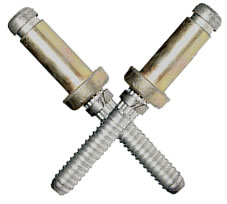
Modern airplanes are constructed with more than just nuts and bolts. In addition to traditional fasteners such as these, they often feature lock bolts.
Lock bolts are two-piece fasteners consisting of a pin and collar. The pin is a bolt-like cylindrical component, whereas the collar is a nut-like component that wraps around the pin. During installation, the collar is swaged onto the exposed end of the pin. Below are five key benefits of lock bolts.
#1) High Tensile Strength
Lock bolts are known for their high tensile strength. Research shows that the tensile strength of lock bolts is about 20% higher than traditional fasteners. As shown in the image above, the pin has thread-like grooves. When the collar is swaged onto the pin, it creates a permanent, strong joint.
#2) Resistance to Vibrations
You don’t have to worry about lock bolts coming loose due to vibrations. The collar is designed to permanently grip the pin. Even if the lockbolt is exposed to vibrations, the collar will remain in place. And as long as the collar is tightly wrapped around the pin, the lockbolt won’t loosen. With their vibration-resistant properties, lock bolts are a popular choice for aircraft. They can handle the constant vibrations of airplanes and other types of aircraft without coming loose.
#3) Easy to Install
Lock bolts are easy to install — all you need is the appropriate swaging tool. You can install a lock bolt by drilling a hole in the objects or parts that you want to fasten, followed by inserting the pin into the hole. Next, slide the collar onto the exposed end of the pin (behind the objects or parts). You can then use the swaging tool to secure the collar to the pin. That’s all it takes to install a lock bolt.
#4) Lightweight
Another benefit of lock bolts is their weight. They weigh less than many other fasteners, including bolt-and-nut combos. By using lock bolts instead of bolt-and-nut combos, aircraft engineers can achieve a low weight. The weight of an aircraft, of course, will affect its performance and efficiency. Heavy aircraft require more power and burn more fuel than their lightweight counterparts, which is why lock bolts are so popular in the aviation industry.
#5) Safe and Reliable
Lock bolts are safe and reliable. Unlike bolts and nuts, they aren’t temporary fasteners. Rather, lock bolts are permanent fasteners. They won’t loosen from vibrations or other external forces, thereby greatly reducing the risk of failure. Because they are safe and reliable, lock bolts are commonly used in sensitive aircraft parts like wings, landing gear assemblies and fuselage panels.



